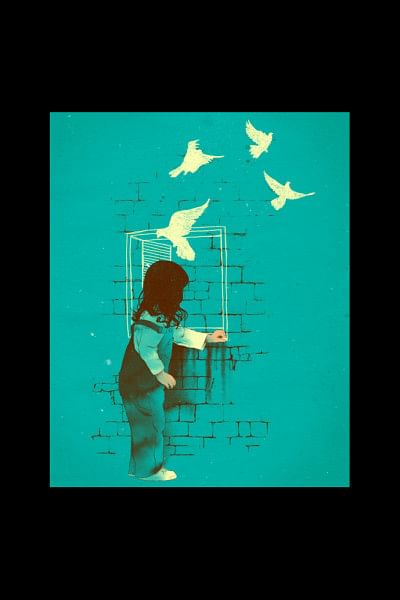The audacity of hope

We live in a world of instant news and communication, with its enormous
benefits and opportunities. But, at the same time, the daily diet of negative and gloomy stories churned by the media make us virtually numb to the violence and brutality perpetrated around the world. The collateral damage from senseless bombings, the slaughter of innocent men and women by terrorists, the racially driven police brutality: nothing seems to affect us anymore. We may shed a tear or two when our TV screens flash the limp body of the boy washed ashore while his family was trying to flee Syria in a rickety, overloaded boat. We may also spend a sleepless night shocked and outraged at the bloodied image of five-year-old Omran rescued from the rubbles of his bombed house in Aleppo. But, soon the images fade and we revert to business-as-usual. The sense of resignation is engendered by the pervasive belief that "life is not fair" and we, the ordinary citizens, are utterly helpless. The net outcome is a gradual shift in values from caring, sharing and empathy to indifference, materialism and egocentrism.
Fortunately, once in a while, the compassionate acts of a few men and women reinstate our belief in the innate goodness of human beings. Recently, I had two seemingly mundane experiences that gave me cause for optimism. Last Sunday, while I was sipping coffee at a neighbourhood restaurant, I noticed an elderly woman come in with a large dish of cookies, which she gave to the receptionist. She proceeded to sit in a corner with her cup of coffee, exchanging an occasional greeting with the servers who seemed to know her well. My curiosity being sufficiently aroused, I asked our waitress if the lady was the proprietor of the café. She told me that the woman brought home-baked cookies for the restaurant staff, each Sunday. In addition, she interacted with the staff offering her advice or help, if needed – in the process, she infused a sense of bonhomie and camaraderie, adding a human touch to the ambiance of the restaurant. This story may not sound noteworthy in the face of the larger problems that we encounter in our daily existence. But noticing the upbeat reaction of the restaurant workers, I was convinced that the simple act of kindness had made a significant dent in the lives of these "invisible" men and women, who too crave for kindness and appreciation.
The other incident was a chance meeting with the owner of a fast food joint, during a visit to Charleston, South Carolina. As a group of Bangladeshi tourists, we caught the attention of this rather ebullient gentleman, who warmly welcomed us and engaged in a conversation. When he discovered that we were from Bangladesh, he revealed that he had adopted ten children from China, India and the Middle East. His childhood and adolescent years in Lebanon, where his father was posted, had helped him develop a deep love and understanding of diverse cultures. He went on to claim that a secure home and a nurturing environment enable children from less privileged families transit into a better life and become more accepting of people of different colour, faith and race. Watching him proudly display a photograph of his multicultural family, I was convinced that he had made a small but important contribution toward making our world more inclusive and tolerant.
The two experiences triggered an interesting chain of thought in my mind -- about the clash between people who believe in an extreme individualistic ideology and those who think that the best outcome in life is produced by the synergy from human beings with different skills and capacities. I wondered if this conflict could be explained by Darwin's theory of 'natural selection', or the preservation of favoured races in the struggle for life. While there have been several interpretations of the Darwinian theory, the one that most appeals to me is that of Russian activist, scientist and philosopher Peter Kropotkin. Kropotkin viewed the concept of "survival of the fittest" as supporting cooperation rather than competition. He argued that the fittest was not necessarily the best at competing individually, but often the community made up of those best at working together. Applying this concept to human society, he concluded: "We can affirm that in the ethical progress of man, mutual support not mutual struggle – has had the leading part."
Today, as I witness unbridled individualism at the cost of collective good, I wonder – will we see a better world where Kropotkin's interpretation of Darwin will hold true? Will the most compassionate and caring survive and help mankind transit into a spiritually and emotionally developed species, and those who create chaos and discord through a callous disregard for others, will gradually become extinct? Will altruism ultimately prevail over selfishness? Or is it just my wishful thinking?
The writer is a renowned Rabindra Sangeet exponent and a former employee of the World Bank.

 For all latest news, follow The Daily Star's Google News channel.
For all latest news, follow The Daily Star's Google News channel. 



Comments